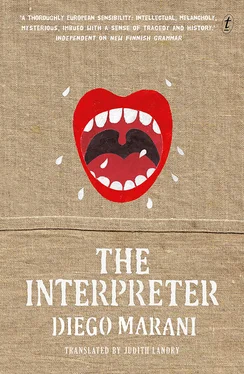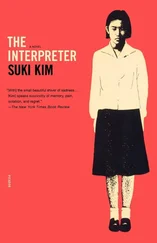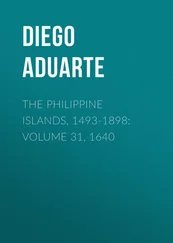‘Are you a foreigner?’ he asked me in German, staring at the elegant windcheater with which Burke had provided me. I nodded.
‘This is the third time this has happened this spring. No one knows how they come to land up here; they don’t come from around these parts, yet dozens of them end up stranded here,’ he said, extending his arms in a puzzled gesture.
‘Will they die?’ I asked.
‘A few will survive until the turn of the tide, but they clearly suffer from being stuck here; they wave their tusks around and moan piteously — you can hear them right in the centre of town. But yes, most of them will die. Then the waves bring them ashore; they get stuck in the sand, like great black stones, and have to be carted away by bulldozers, because they make a terrible stench,’ he said with a look of utter disgust. I followed him towards the shore, dragging my feet in the sand.
‘The strange thing is, they’re all male; only the males have that tusk. And they’re all young; it’s as though a whole generation had lost its sense of direction and started wandering through the Baltic, looking for a way out towards the Arctic!’ He paused, as though pondering the matter.
‘They’re not afraid of humans; they let themselves be touched,’ he went on; going up to one of them, he drew his hand over the dark skin of its back, sheathed in a layer of glittering sand. The narwhal gave a weary shake of its tail, lifted its tusk and sank back into the stagnant shallows.
‘Have you seen them fight?’
I shook my head.
‘They clash their tusks together like sabres and fight endless duels. I’ve caught them at it on occasions, in the ice floes, outlined against the rose-pink wall of the arctic ice, when there’s no wind and it’s never dark — it’s a rare sight. They heave themselves out of the water black as pitch, and in that endless silence you can hear their tusks rattling like branches in the wind!’
I looked towards the throng of animals, now vanishing into the mist; some of them had ceased moving, and were gradually sinking into the sand.
‘Can you smell that smell? They smell of seaweed, of the depths, of a cold, dark world where man has never set foot!’ he went on, staring at me with an expression I could not fathom. Then he waved me a mournful goodbye and wandered towards the creatures furthest off, at the far side of the shallows; feeling they had sufficient water around them to make a getaway, they were flinging themselves this way and that, leaping about frantically in their efforts to reach the open sea.
Cold and bedraggled, I plodded up the beach, then sat down and rubbed my numb feet before putting on my shoes. A sudden burst of blinding sunlight pierced through the mist, lighting up the doomed landscape with a surreal gleam; floating there on the hushed surface, the narwhals took on the appearance of one single, gigantic beast, its back bristling with barbs. As though it had registered this similarity, the crowd on the beach let out a unanimous gasp; the shells embedded in the creatures’ skin now caught the glancing light and sparkled like shards of glass; even the damp sand lit up in a fitful glitter.
I hurried back to the hotel; I wanted to wake Burke up and take him to see the beached narwhals. But there was a message for me from him at the reception desk:
Mr Bellamy, this morning someone called about our ad, a certain Mirko Stolojan. I’ve agreed to meet him at ten. If you want to join us, this is the address: Perkelos Gatve 40, Klaipeda. The porter tells me it’s a road somewhere near the port. See you later,
K. Burke.
Still stiff with cold and bewildered by the message, I stared idiotically at the porter, who in his turn was giving me a puzzled look.
‘What time is it?’ I asked out of the blue.
‘A quarter past ten. Breakfast is over, but we could still serve you some coffee,’ he hastened to assure me, as though he could read my thoughts. I folded up the note and leaned wearily against the counter; nothing would have been more welcome than a cup of hot coffee, its smell wafting towards me from the jugs on the trolley by the window. I was hungry and tired from my long walk; I could have sat down in the foyer and waited quietly for Burke’s return. But my head was spinning, as I now had another worry.
‘Is there anything wrong, sir?’ enquired the doorman solicitously.
‘No, everything’s fine,’ I said distractedly, then ran out of the foyer and leapt into the first of the taxis parked in front of the hotel.
Perkelos Gatve was a quiet residential road which began just beyond the mouth of the harbour canal, below the last cranes in the goods yard, to continue along the coast and on into the woods. Number forty was a small villa with an unfenced garden, set back a little from the road; it was surrounded by an unkempt lawn dotted with thorny bushes, sloping gently down to the shore. I waited for the taxi to drive off, then walked up the sandy path to the door, which was on the right side of the house; I rang the bell, but there was no answer. Total silence, except for a rustling of leaves. After a few minutes, I rang again, then went to peer in through the small window which gave on to the street, but all I could see was a dark wooden chest of drawers and a divan upholstered in some pale material. I checked Burke’s message — I was at the right address. I inspected the back of the house, the side facing the sea, where there was a tradesmen’s entrance; I knocked and found it was open, so I went in.
‘Is anyone at home?’ I called, and immediately found myself in the living room I’d seen through the window. It was furnished like the cabin of a ship, with brass lamps hanging from brightly painted beams and gleaming doorhandles. All in apple-pie order, not a speck of dust. It smelled of ammonia and well-oiled rope; a clock in a copper case ticked on the chest of drawers. In the kitchen I heard the buzz of a fridge; I opened the door — it was empty, but immaculate. I went back into the living room, which was dimly lit by such light as made its way in through a little porthole of coloured glass. A wooden staircase led to the upper floor; the handrail and banisters were carved with elaborate motifs connected to the sea, and small glass cases containing weirdly shaped shells hung from the wooden walls. I went up cautiously and found myself in a large studio which took up the whole floor, the end wall occupied by a nautical chart of the Baltic Sea; on a console table between the two windows stood a small model of a sailing ship bearing the Polish flag. Behind a table strewn with books and maps, almost the whole of the opposite wall was occupied by a sophisticated sound system; I was intrigued by the two large spools, placed behind a glass panel, and the sound boxes, protected by thick chunks of foam. The only remaining empty space, I noticed, was occupied by a document set in a gold frame, which proved to be a diploma — awarded by the University of Heidelberg to Mirko Stolojan, a simultaneous translator whose languages were Russian, Latvian and Lithuanian. Overcome by sudden weariness, I sat down in the leather armchair in front of the sound system. I was sweating profusely, though from exhaustion rather than emotion, and my throat was strangely dry. Through the porthole I could see the dark mass of water, heaving like a slab of steel, sending ripples of white light over the walls of the room. Since it was right there in front of my nose, I pressed the button on the sound system, setting the spools in motion. At first it gave out a dry whirring noise, then the sound of waves on the seashore and distant engines; then suddenly there was a voice, perfectly loud and clear. I recognised it — it was that of the interpreter, speaking in German, in the typically distant tone adopted by such professionals. I noted the awkward way the sentences were stitched together, the tail ends left loose, then suddenly if clumsily tidied up and made to fit together. Another voice was audible in the background, probably that of the original speaker, but I couldn’t make out what language he was speaking; the words seemed to me short, three syllables at most, with the stress on the penultimate. He must have acquired it relatively recently if he had such trouble translating it. I carried on listening, and then I heard his voice changing, becoming deeper and taking on a syncopated rhythm, with mangled single syllables and incomprehensible combinations of diphthongs. Then I recognised the wheezing, rasping, gurgling sounds given out by the uvula when the throat muscles become constricted. If in some ways similar, those sounds were also different from those which I myself produced when I was having one of my convulsions. I thought the effort involved might have explained the difference. I listened on, until the sound lost all resemblance to any human voice and became just a whistle, rising and falling, elusive and mysterious. I saw him in my mind as he had been that last time by the lake, and it occurred to me to wonder whether indeed that tape might have been recorded in that very place, on just such a wild night. I wound back the spool and put on another, then another; all they contained were whistling, lowing sounds, a slow repeated twittering interspersed with a low buzz. No trace of a human voice, as though he had ceased to speak once and for all, and was now simply howling.
Читать дальше












